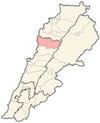
Aqoura
Aaqoura
عاقورة- عاقورا Aaqoura | |
|---|---|
 Aqoura, 2017 | |
| Coordinates: 34°7′11″N 35°54′12″E / 34.11972°N 35.90333°E | |
| Country | Lebanon |
| Governorate | Keserwan-Jbeil |
| District | Byblos |
| Area | |
| • Total | 140 km2 (50 sq mi) |
| Elevation | 1,450 m (4,760 ft) |
Aqoura (Arabic: عاقورة, also spelled Aaqoura, "Akoura") is a mountainous village in the Byblos District of Keserwan-Jbeil Governorate, Lebanon. It is located 68 kilometers north of Beirut. Aaqoura has an average elevation of 1,600 meters above sea level (between 1000 and 2189 m) and a total land area of around 120 square kilometers.[1] Aaqoura's inhabitants are Maronite Catholics and Aaqoura is considered to be the birthplace of Maronitism and the origin of the overwhelming majority of all Lebanese Maronite families.[citation needed] Nature wise, Aaqoura is known to have one of the most breathtaking mountain chain in the world and is known to be very rich in water fountains and rivers and it is as well home to numerous caves, including the second (Rweiss) and fourth (Ain El Lebneh Grotto) deepest caves in Lebanon.

By area, Aaqoura is the largest village in Lebanon (belonging to its citizens - not emirate أميرية lands) in Lebanon. By voting power, it is the third largest town in the Byblos Jbeil District after Jbeil Byblos and Qartaba.[2]

Maronites emerged from Aaqoura in the fourth century when Saint Maroun's disciple Ibrahim El Korchy started preaching and converting pagans to the Christian faith in the Aaqoura area. The carved stone Saint Peter and Paul church in Aaqoura is by far the oldest existing church in Lebanon and one of the oldest in the world. It was converted in the 4th century from a tomb place to the priests of the temple of Ashtarout in Afqa to a church.[vague]

The village of Aaqoura is known for the famous mountain chains surrounding and protecting it. These mountains have offered refuge for the citizens of Aaqoura during the different wars in Lebanon and the region. Also known for their courage, hospitality, and their intelligence the people of Aaqoura are studying and working worldwide. The local citizens work, value, and guard their lands. They cherish and proclaim their Christianity and play a major role in Lebanon through their political influence and their international relations.

Demographics
Religion
As of 2022, the religious make-up of the town's 4,152 registered voters were roughly 92.3% Maronite Catholics, 3.1% Greek Orthodox, 2.4% Greek Catholic, 0.8% Christian Minorities, and 1.4% others.[3]


References
- ^ "Aaqoura (Jbayl)". Localiban. Localiban. 2006-02-22. Retrieved 2016-02-12.
- ^ "Districts in Depth: Jbeil". NOW News. 2009-05-28. Archived from the original on 2017-07-28. Retrieved 2016-02-12.
- ^ "Mapping Lebanon: Data and statistics".

See what we do next...
OR
By submitting your email or phone number, you're giving mschf permission to send you email and/or recurring marketing texts. Data rates may apply. Text stop to cancel, help for help.
Success: You're subscribed now !


